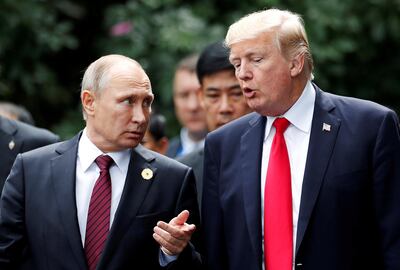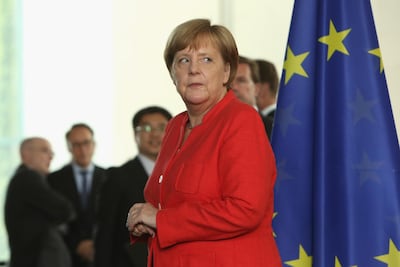There is trepidation in the air of Europe's de facto capital, a city of multilateral institutions, shared commitments and common values at odds with Donald Trump's "America First" agenda.
When the United States president arrives in Brussels on Tuesday for the Nato summit, delegates will likely know that past gatherings are no longer reliable predictors.
The 29 members of the military alliance traditionally use their annual meeting to affirm a commitment to collective security.
But this year's event at Nato's US$1.45 billion ($5.33bn) headquarters, a building Mr Trump inaugurated last year, could be dramatic — such is the US leader's unpredictable and erratic diplomacy.
The portents of possible discord lie in the rupture of G7 harmony at Charlevoix, Canada, last month.
There, Mr Trump stunned allies by refusing to sign a joint communique. He then tweeted insults at Canadian Prime Minister Justin Trudeau from aboard Air Force One while travelling to meet North Korean dictator Kim Jong-un, upon whom he lavished praise.
As such, European states fear this year's Nato summit could end up looking like the second scene of a disaster movie by the time Wednesday and Thursday's meetings are over.
______________
Read more:
NATO Summit: The key issues on the table for alliance
Nato expected to reaffirm commitment to Afghanistan
Opinion: 'America first' is quickly turning into America alone
Alan Philps: The spectre of Trump-Putin meeting looms over Nato summit
______________
The US is by far the alliance's biggest contributor, although Mr Trump last year branded it obsolete. He retains the ability to deal a hammer blow to its relevance or, worse, lay the groundwork for a messy break-up that would shatter transatlantic relations.
"Donald Trump has the potential to make every meeting with allies as disastrous as the June G7 summit," says James Goldgeier, a visiting senior fellow at the Council on Foreign Relations and a professor at American University, an expert on Nato and security alliances.
"We have no way of knowing how Donald Trump will behave and neither does his staff. Will he stick to remarks prepared by staff or go off-script?"
That uncertainty will only be answered when allies, along with the rest of the world, realise which Mr Trump has turned up at the summit: the one who could give himself credit for Nato countries' increased spending, or the one who could publicly lambast leaders such as German Chancellor Angela Merkel, for not doing enough on defence.
"The unpredictability alone is a nerve-wracking prospect. Nato summits are not meant to be shows of gamesmanship," says Nina Jankowicz, global fellow at The Wilson Centre, a Washington think-tank.
Nato officials, for now at least, are putting on a brave face, saying the summit is an opportunity to recognise differences between Washington and its allies, and work to repair them.

"We are confident that they will not break the transatlantic bond," one Nato staffer told The National, on condition of anonymity.
"It is in our interest to stay united. Two world wars and a cold war have taught us that together, Europe and North America are stronger, safer and more prosperous. We must continue to work hard to settle our differences."
Trump, the undesignated leader of the alliance, will meet with Jens Stoltenberg, its secretary-general, on Tuesday before taking part in high-level meetings with the 28 other member states on Wednesday.
Kay Bailey Hutchinson, the US ambassador to Nato, has said the meetings will centre on threats emanating from Moscow.
"Our major areas of deterrence would be Russia and the malign activities of Russia, the efforts of Russia to divide our democratic nation,” she told reporters last week.
Other areas of discussion will include non-Nato members Georgia and Ukraine, both former Soviet republics who have sought protection from Russia. The Nato mission in Afghanistan will be another topic where Russia arises. In March, the US accused Moscow of arming and funding the Afghan Taliban against the alliance’s troops.
But Russia remains a possible faultline between Mr Trump and Nato.
___________
Opinion: Trump's stubborn self-belief may actualise Putin's dream to destroy Nato
___________
The US president has caused concern across the capitals of Europe, where he is perceived as not doing enough to protest against Russian actions in Europe, particularly in its annexation of Crimea, its incursions into Ukraine and interference in some of the continent’s key political votes.
More galling for the Europeans is that Mr Trump will host his first face-to-face summit with Russian President Vladimir Putin in Helsinki on July 16, just days after the Brussels meetings.
Following his short but explosive G7 visit last month, Mr Trump went to Singapore and gave concessions to North Korean leader Mr Kim, also abruptly ending joint military drills with South Korea to the surprise of Seoul. There is concern that he could do the same with Russia and its government, who his 2016 election campaign team are under investigation for colluding with.
For their part, Nato's European members will again be expected to do more on defence spending. Mr Trump's call for more countries to meet the two percent of GDP threshold on defence expenditure is not new. Many of his White House predecessors have urged greater burden-sharing.
But only six Nato members – Britain, Greece, Estonia, Romania, Poland and the US – currently meet that target. Some of the alliance's biggest states, including Canada, Spain and France fall short. The number one target of the American president's ire has been Germany, which also fails to meet its two per cent obligation.
Last week, at a rally in Montana, Mr Trump chastised chancellor Merkel about Washington's contribution to her country’s defence.

"I said, you know, Angela, I can't guarantee it, but we're protecting you, and it means a lot more to you. ... I don't know how much protection we get from protecting you."
He then labelled Americans "the schmucks that are paying for the whole thing".
Yet if the Europeans and Canada make moves to hike defence spending, as they already have done since Mr Trump's inauguration – there has been an increase of 3.8 per cent of total spending in 2018 so far – there is hope that he could revive the creaking alliance.
Mr Trump and his team, including Defence Secretary James Mattis and Secretary of State Mike Pompeo, consider Nato to be more important than the G7, despite his recent comments that the alliance was "worse than Nafta" for the US.
Josef Janning, head of the Berlin office of the European Council on Foreign Relations, says such linkages remain significant. "Nato still is relevant to people who are relevant to Trump. That will help to contain the risk."
And beyond Mr Trump's bombast lies some optimism within Brussels.
"Despite Trump's rhetoric, much of the policies from the Trump administration have benefited Nato and its European Allies," a senior European parliament official says. "Enhanced Forward Presence and the European Reassurance Initiative are the two best examples," the official adds, referring to rotating Nato-led battalions stationed in Estonia, Latvia, Lithuania and Poland.
Ultimately, both Mr Trump and European states want something from the summit. For Mr Trump, pledges of greater contributions. For Europe, that the US president remains committed to the alliance.
But although three more countries will meet the two per cent threshold in 2018, according to Mr Stoltenberg, Europeans feel the US leader has not sent the right messages.
"They are worried because the US commitment to European security has defined the world during their lifetimes. They want to know if that commitment is still there, and they don’t just want to hear that commitment from Ambassador Hutchinson and Secretary Mattis," says Mr Goldgeier. "They want to hear it from the president of the United States."

